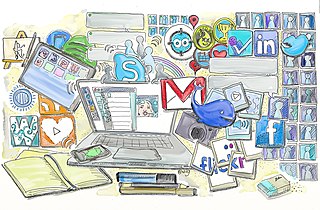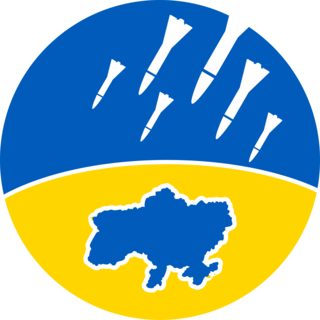Hyperlocal is information oriented around a well-defined community with its primary focus directed toward the concerns of the population in that community. The term can be used as a noun in isolation or as a modifier of some other term. When used in isolation it refers to the emergent ecology of data, aggregators, publication mechanism and user interactions and behaviors which centre on a resident of a location and the business of being a resident. More recently, the term hyperlocal has become synonymous with the combined use of applications on mobile devices and GPS technology. Use of the term originated in 1991, in reference to local television news content.

A social networking service or SNS is a type of online social media platform which people use to build social networks or social relationships with other people who share similar personal or career content, interests, activities, backgrounds or real-life connections.

In computing, a news aggregator, also termed a feed aggregator, content aggregator, feed reader, news reader, or simply an aggregator, is client software or a web application that aggregates digital content such as online newspapers, blogs, podcasts, and video blogs (vlogs) in one location for easy viewing. The updates distributed may include journal tables of contents, podcasts, videos, and news items.

ABS-CBN Digital Media, commonly known as Digital Media Division, and also known as ABS-CBN Interactive, is the digital media and internet division of ABS-CBN Corporation. It was formerly a separate company operating as a wholly owned subsidiary of ABS-CBN until 2013, when ABS-CBN Interactive, Inc. was merged to its parent. ABS-CBN Digital Media is responsible for overseeing all of ABS-CBN's internet and digital properties which include websites, mobile and web applications, social media accounts, and the distribution of ABS-CBN's contents to digital and online space. ABS-CBN Digital Media has made many first in Philippine media, such as the first ever TV network website, the first ever Filipino news website, and the first Filipino video streaming website. In 2017, the company was the largest in digital media platforms in the Philippines.

User-generated content (UGC), alternatively known as user-created content (UCC), is generally any form of content, such as images, videos, text, testimonials, and audio, that has been posted by users on online content aggregation platforms such as social media, discussion forums and wikis. It is a product consumers create to disseminate information about online products or the firms that market them.

Social media are interactive technologies that facilitate the creation, sharing and aggregation of content, ideas, interests, and other forms of expression through virtual communities and networks. Social media refers to new forms of media that involve interactive participation. While challenges to the definition of social media arise due to the variety of stand-alone and built-in social media services currently available, there are some common features:
- Social media apps are online platforms that enable users to create and share content and participate in social networking.
- User-generated content—such as text posts or comments, digital photos or videos, and data generated through all online interactions—is the lifeblood of social media.
- Users create service-specific profiles for the website or app that are designed and maintained by the social media organization.
- Social media helps the development of online social networks by connecting a user's profile with those of other individuals or groups.
StudiVZ, SchülerVZ and MeinVZ was a social networking platform for students that was based in Berlin, Germany. The name is an abbreviation of the German expression Studentenverzeichnis, which means students' directory.
A social news website is a website that features user-posted stories. Such stories are ranked based on popularity, as voted on by other users of the site or by website administrators. Users typically comment online on the news posts and these comments may also be ranked in popularity. Since their emergence with the birth of Web 2.0, social news sites have been used to link many types of information, including news, humor, support, and discussion. All such websites allow the users to submit content and each site differs in how the content is moderated. On the Slashdot and Fark websites, administrators decide which articles are selected for the front page. On Reddit and Digg, the articles that get the most votes from the community of users will make it to the front page. Many social news websites also feature an online comment system, where users discuss the issues raised in an article. Some of these sites have also applied their voting system to the comments, so that the most popular comments are displayed first. Some social news websites also have a social networking service, in that users can set up a user profile and follow other users' online activity on the website.
Keek was a free online social networking service that allowed its users to upload video status updates, which were called "keeks". Users could post keeks to the Keek website using a webcam or via the Keek mobile apps for iPhone, Windows Phone, BlackBerry, or Android. Users could also reply back with text or video comments, known as "keekbacks", and share content to other major social media networks. There was also an embed option so users could embed their keeks into a blog or website.
Microblogging is a form of blogging using short posts without titles known as microposts. Microblogs "allow users to exchange small elements of content such as short sentences, individual images, or video links", which may be the major reason for their popularity. Some popular social networks such as Twitter, Mastodon, Tumblr, Koo, and Instagram can be viewed as collections of microblogs.

Seesmic was a suite of freeware web, mobile, and desktop applications which allowed users to simultaneously manage user accounts for multiple social networks, such as Facebook and Twitter.
Social network aggregation is the process of collecting content from multiple social network services into a unified presentation. Examples of social network aggregators include Hootsuite or FriendFeed, which may pull together information into a single location or help a user consolidate multiple social networking profiles into a single profile.
Dreamwidth is an online journal service based on the LiveJournal codebase. It is a code fork of the original service, set up by ex-LiveJournal staff Denise Paolucci and Mark Smith, born out of a desire for a new community based on open access, transparency, freedom and respect.
Flipboard is a news aggregator and social network aggregation company based in Palo Alto, California, with offices in New York, Vancouver, and Bejiing. Its software, also known as Flipboard, was first released in July 2010. It aggregates content from social media, news feeds, photo sharing sites, and other websites, presents it in magazine format, and allows users to "flip" through the articles, images, and videos being shared. Readers can also save stories into Flipboard magazines. As of March 2016 the company claims there have been 28 million magazines created by users on Flipboard. The service can be accessed via web browser, or by a Flipboard application for Microsoft Windows and macOS, and via mobile apps for iOS and Android. The client software is available at no charge and is localized in 21 languages.
Since the arrival of early social networking sites in the early 2000s, online social networking platforms have expanded exponentially, with the biggest names in social media in the mid-2010s being Facebook, Instagram, Twitter and Snapchat. The massive influx of personal information that has become available online and stored in the cloud has put user privacy at the forefront of discussion regarding the database's ability to safely store such personal information. The extent to which users and social media platform administrators can access user profiles has become a new topic of ethical consideration, and the legality, awareness, and boundaries of subsequent privacy violations are critical concerns in advance of the technological age.
Summify was a social news aggregator founded by Mircea Paşoi and Cristian Strat, two former Google and Microsoft interns from Romania. The service emailed its users a periodic summary of news articles shared from their social networks based on relevance and importance. The platform supported Twitter, Facebook, and Google Reader accounts. Advisors to Summify include Ryan Holmes, CEO of Hootsuite and Ethan Anderson, CEO of Redbeacon.

JManga was an American website and international online community focused on the promotion, distribution, and monetization of digital comics as well as the development of other manga related services. Founded in December 2010 and backed by the 36 publishers of the Japanese Digital Comics Association, JManga was intended to serve as a legal alternative to scanlation sites and online piracy. The site was closed in June 2013.

In Russia, internet censorship is enforced on the basis of several laws and through several mechanisms. Since 2012, Russia maintains a centralized internet blacklist maintained by the Federal Service for Supervision of Communications, Information Technology and Mass Media (Roskomnadzor).
Livestreamed news refers to live videos streams of television news which are provided via streaming television or via streaming media by various television networks and television news outlets, from various countries. The majority of live news streams are produced as world news broadcasts, by major television networks, or by major news channels; however, there are some live news streams which are produced by individual local television channels as well.

Ukraine Siren Alerts (UASA) is a siren alert electronic system created by Israeli student Bernard 'Boaz' Moerdler. The system automatically alerts users of sirens in Ukraine using data from municipal and cities who post alerts on their website and is based on Israel's Red Color system, which alerts users when a siren is sounded anywhere in Israel. Initially launched on Twitter, the system has since expanded to Telegram and Facebook channels alongside releasing their new website which includes SMS and email alerts.










